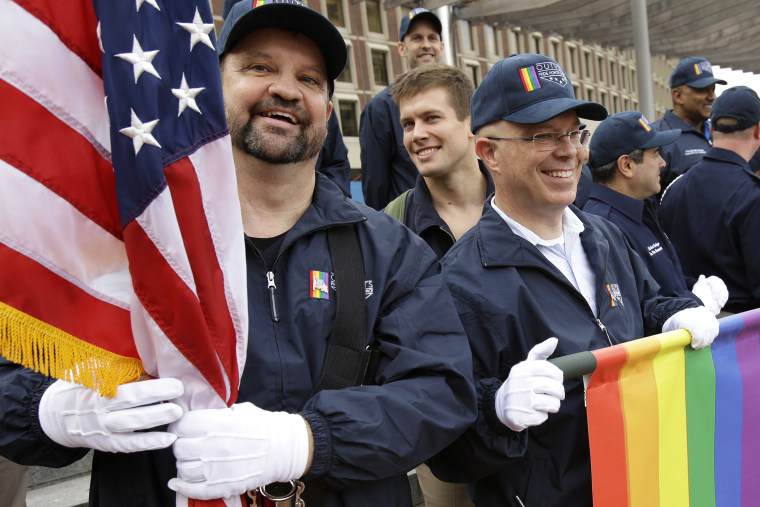Following a decades-long struggle to open up South Boston's famed St. Patrick's Day parade to LGBT organizations, a different Beantown celebration managed to break down that deep-rooted barrier. On Tuesday, a small contingent of the newly-formed group OutVets became the first LGBT organization in history to march in Boston's Veterans Day parade.
RELATED: ‘Don’t Ask, Don’t Tell’ lives on for transgender troops
Though the marchers, dressed modestly in matching baseball caps and navy jackets, may have seemed like just another group in the procession, they reflected a growing acceptance of gays and lesbians in the U.S. military, as well as in the city of Boston.
“For the first time in our nation’s history, gay service members and veterans are playing on a more level playing field,” said Bryan Bishop, OutVets' founder, in a statement. “And it is time we recognize those individuals who not only served under fire in a war or conflict but simultaneously fought a war of ideals with the very nation they were fighting, and in some cases dying, to protect.”
Massachusetts was the first state in the nation to legalize marriage equality, and became the first state last week to elect an openly gay attorney general. But Boston has a more complicated record when it comes to equality.
OutVets' participation in Tuesday's parade stood in stark contrast to the controversial and longstanding ban on LGBT groups in the South Boston St. Patrick's Day parade, which became a flashpoint in the gay rights movement more than two decades ago. In 1992, St. Patrick's Day parade organizers refused to allow Boston's Irish-American Gay, Lesbian, and Bisexual Group to march, a decision which was ultimately upheld in a unanimous Supreme Court ruling.
Former Mayor Thomas M. Menino, who passed away last month, boycotted the St. Patrick's Day parade throughout his entire time in office because of its exclusion of gays and lesbians. After weeks of negotiations fell through over whether to allow the LGBT group, MassEquality, to march this year, Mayor Martin J. Walsh ended up boycotting as well. He called OutVets' participation in Tuesday's parade a "groundbreaking historical moment," according to the Associated Press. MassEquality also applauded the event.
"The inclusion of the OutVets contingent in the Boston Veteran's Day Parade is consistent with the values of Boston and our great Commonwealth," said KC Coredini, executive director of MassEquality, in an emailed statement to msnbc. "We hope that the organizers of the St. Patrick's Day Parade will follow suit."
RELATED: In post-DOMA world, gay couples still face Tax Day challenges
Though openly gay veterans achieved an important milestone this week in Boston, LGBT advocates insist they're still suffering from discriminatory policies at the national level. For the purposes of granting spousal benefits, the Department of Veterans Affairs relies on a federal provision, known as Title 38, which defines a marriage as valid "according to the law of the place where the parties resided at the time of the marriage." That means that married same-sex couples who live in one of the 18 states that currently do not recognize their unions lose out on crucial veterans benefits, like disability compensation or the VA home loan. (Married veterans receive a higher rate of compensation and qualify for larger loans.)
"Extra dollars mean a lot to vets who struggle paycheck to paycheck," said Chris Rowzee, spokesperson for the American Military Partner Association (AMPA), to msnbc. "It can mean a decent home for some veterans."
After the Supreme Court gutted the Defense of Marriage Act (DOMA) last year, President Obama directed federal agencies to update their policies so that they treated all marriages equally. The State, Defense, Treasury, and Homeland Security Departments did just that. But in order to change Title 38, Congress would need to act -- a possibility that became even more remote once Republicans dominated last week's midterm elections. (Earlier this year, the GOP-controlled House Committee on Veterans' Affairs voted down an amendment that would have allowed the VA to award benefits to same-sex couples living in states where marriage equality had not been legalized.)
"Legislative action would change the law," said Rowzee, "but I think we all know how likely that is to happen."
What else would help same-sex spouses of military veterans? AMPA has filed a federal challenge to the VA's regulations that is currently pending in the United States Court of Appeals for the Federal Circuit. Rowzee also believes the kind of visibility that comes with seeing openly gay vets march in a parade will go a long way. "A lot of Americans are under the mistaken impression that when DOMA fell, everything became perfect," said Rowzee. "It's always helpful for people to see us, get to know us, and understand that we're just like they are."
